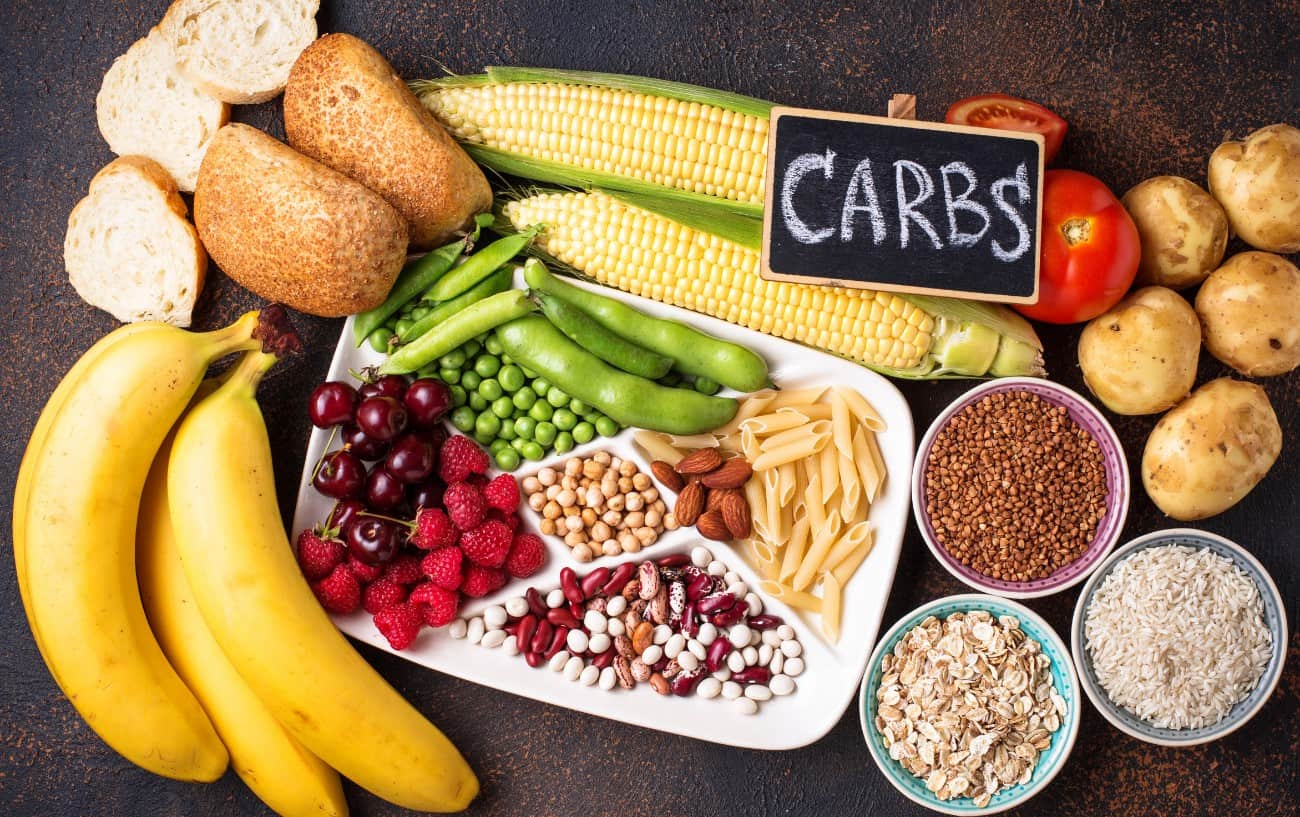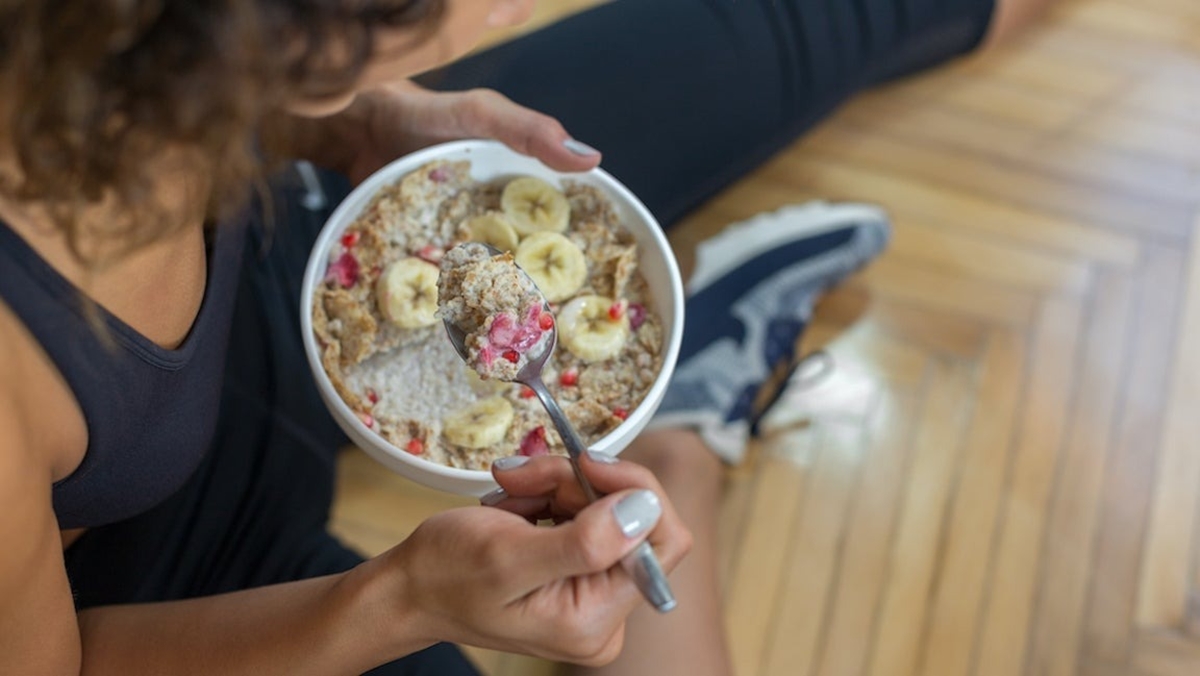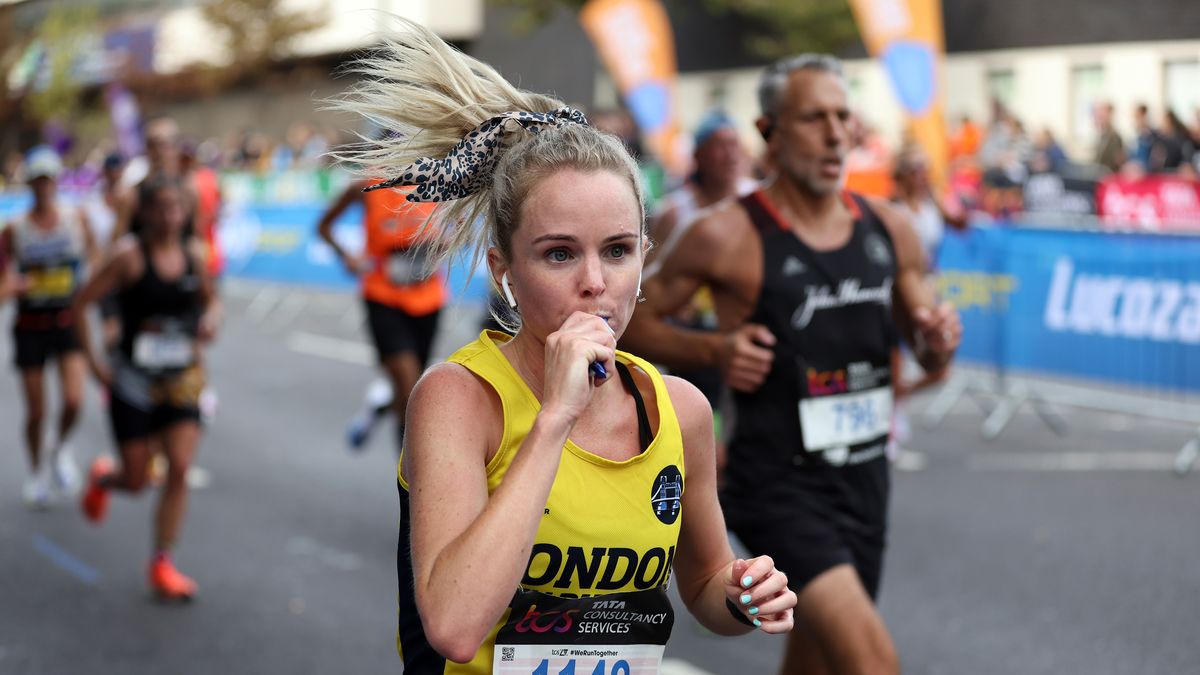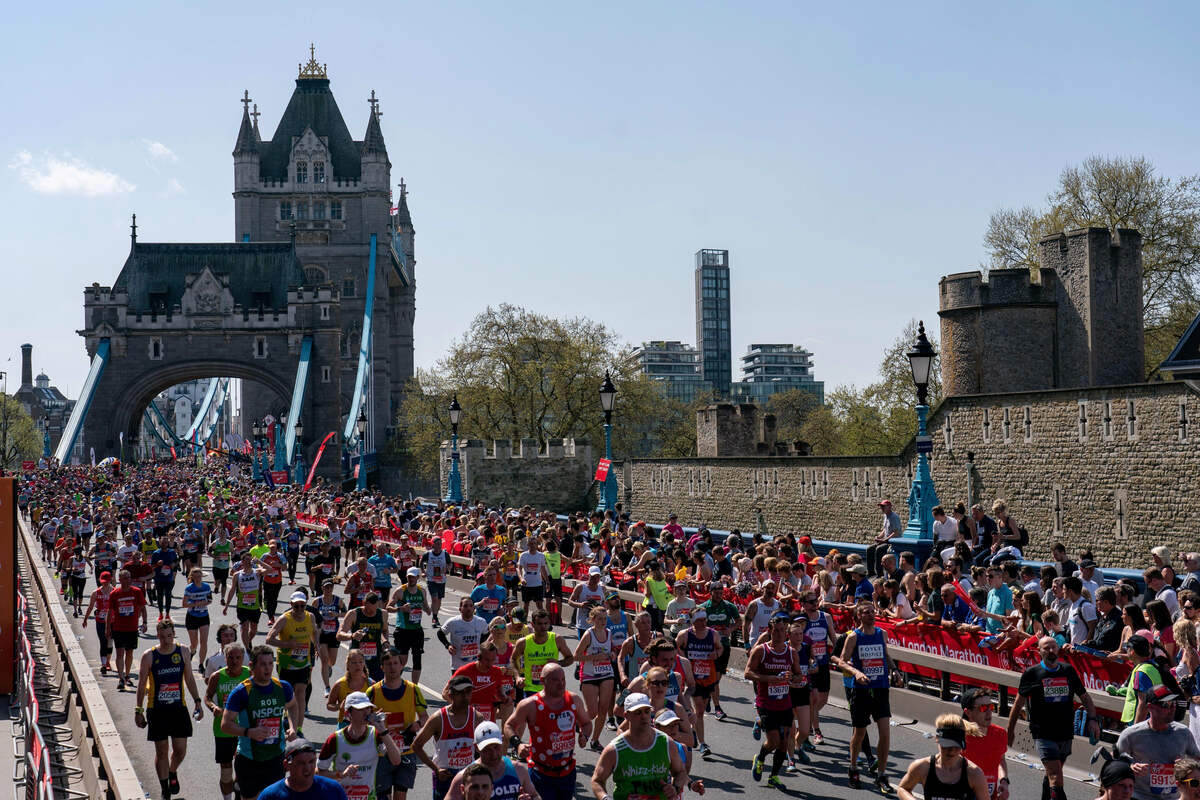Home>Misc>Featured>How Many Calories Do Marathon Runners Eat


Featured
How Many Calories Do Marathon Runners Eat
Modified: January 22, 2024
Discover how many calories featured marathon runners eat and learn their secrets to fueling their bodies for long-distance running.
Introduction
Welcome to the world of marathon running, where the human body is pushed to its limits in pursuit of the ultimate endurance challenge. As a marathon runner, you know that training for and completing a marathon requires not only physical strength and mental fortitude, but also careful attention to your nutrition and caloric intake.
Eating the right amount and types of calories is crucial for marathon runners to perform at their best and recover effectively. In this article, we will explore the importance of proper caloric intake for marathon runners and delve into the factors that influence their caloric needs. We will also discuss the recommended caloric intake, macronutrient balance, nutrition strategies before, during, and after runs, and common mistakes to avoid.
Whether you’re a seasoned marathon runner looking to optimize your performance or a beginner preparing for your first race, understanding how many calories to eat is a fundamental aspect of your training regimen. So, let’s dive in and discover the secrets to fueling your marathon journey!
The Importance of Proper Caloric Intake for Marathon Runners
Proper caloric intake is essential for marathon runners for several reasons. Firstly, your body needs fuel to sustain the intense physical demands of long-distance running. Secondly, consuming enough calories ensures that you have enough energy to support muscle repair and recovery. Lastly, maintaining a balanced caloric intake is crucial for maintaining a healthy weight and preventing nutritional deficiencies.
When you engage in marathon training, your body goes through rigorous workouts and long runs that deplete your energy stores. Without an adequate caloric intake, you may experience fatigue, decreased performance, and increased risk of injuries. Running a marathon requires a significant amount of energy, and fueling your body properly before, during, and after workouts and races is vital.
By consuming enough calories, you provide your body with the energy it needs to power through your workouts, maintain optimal pace, and prevent hitting the dreaded “wall” during the race. Insufficient caloric intake can lead to a decrease in muscle glycogen stores, making it harder for your body to access the energy it needs to perform at its best.
In addition to fueling your workouts, consuming enough calories is crucial for post-run recovery. After a marathon or intense training session, your muscles are damaged and need to repair and rebuild. A proper caloric intake, along with sufficient protein, helps support this process. Not getting enough calories can hinder your recovery and prolong muscle soreness and fatigue.
Furthermore, maintaining a balanced caloric intake is essential for weight management. It’s important to remember that every runner’s caloric needs are different, depending on factors such as age, gender, body composition, and training intensity. However, consistently consuming too few calories can lead to weight loss, muscle wasting, and a weakened immune system, all of which can negatively impact your marathon performance.
On the other hand, overconsuming calories can lead to weight gain and potentially impair your running performance. Striking the right balance is key. By monitoring your caloric intake and adjusting it according to your training needs, you can optimize your energy levels and maintain a healthy weight.
In summary, proper caloric intake is of utmost importance for marathon runners. It provides the fuel needed to sustain intense workouts, supports muscle repair and recovery, and helps maintain a healthy weight. By understanding and meeting your personal caloric needs, you can enhance your performance and ultimately achieve your marathon goals.
Factors Influencing Caloric Needs in Marathon Runners
Caloric needs in marathon runners are influenced by various factors that must be taken into account for optimal performance and overall well-being. Understanding these factors can help you determine how many calories you should consume during your training and race preparations.
- Basal Metabolic Rate (BMR): Your BMR refers to the number of calories your body needs to perform basic functions at rest, such as maintaining body temperature and preserving organ function. It is influenced by factors such as age, gender, height, and weight. The BMR forms the foundation of your caloric needs and should be considered when calculating your total daily calorie intake.
- Training Intensity and Duration: The intensity and duration of your training sessions significantly impact your caloric needs. As you increase the intensity of your workouts or extend your training duration, your body requires more energy to fuel these activities. High-intensity interval training and long-distance runs will elevate your calorie expenditure and thus necessitate a higher caloric intake.
- Body Composition: The ratio of muscle to fat in your body composition also affects your caloric needs. Muscles are more metabolically active than fat, meaning they burn more calories even at rest. If you have a higher percentage of muscle mass, your caloric needs may be higher compared to someone with a higher proportion of body fat.
- Gender: Gender plays a role in caloric needs due to differences in body composition, hormone levels, and metabolic rate. Generally, men tend to have more muscle mass and a higher metabolic rate, resulting in increased caloric requirements. However, it is essential to consider individual variations and not rely solely on gender when determining caloric intake.
- Climate: The climate in which you train and run can impact your caloric needs. Running in hot and humid conditions increases sweat production and loss of fluids, which can affect your overall energy balance. It is essential to adjust your caloric intake accordingly, as your body will need more energy to regulate body temperature and cope with the demands of exercising in a challenging climate.
- Race Goals: Your specific race goals can influence your caloric needs as well. If you aim to improve your marathon time or complete a race at a fast pace, you may require additional energy to sustain a higher running speed and intensity. On the other hand, if your goal is simply to finish the race, your caloric needs may be slightly lower.
These factors highlight the importance of individualizing your caloric intake as a marathon runner. While general guidelines can provide a starting point, it is crucial to adjust your caloric needs based on your unique circumstances. Consulting with a sports nutritionist or a registered dietitian who specializes in endurance sports can further assist you in determining your specific caloric requirements.
Recommended Caloric Intake for Marathon Runners
Determining the ideal caloric intake for marathon runners involves considering their training intensity, body composition, goals, and individual factors. While individual needs may vary, general guidelines can help provide a starting point for calculating your daily caloric intake.
A common rule of thumb for calculating daily caloric intake is to multiply your basal metabolic rate (BMR) by an activity factor. The Harris-Benedict equation is often used to estimate BMR:
Men: BMR = 88.362 + (13.397 × weight in kg) + (4.799 × height in cm) – (5.677 × age in years)
Women: BMR = 447.593 + (9.247 × weight in kg) + (3.098 × height in cm) – (4.330 × age in years)
Once you have calculated your BMR, multiply it by an activity factor that corresponds to your training level:
- Sedentary (little to no exercise): BMR x 1.2
- Lightly active (light exercise/sports 1-3 days per week): BMR x 1.375
- Moderately active (moderate exercise/sports 3-5 days per week): BMR x 1.55
- Very active (hard exercise/sports 6-7 days per week): BMR x 1.725
- Extremely active (very hard exercise/sports and a physical job): BMR x 1.9
It is important to note that these activity factors are estimates and may require adjustments based on your specific circumstances.
For marathon runners, including both training and race days, a calorie intake ranging from 45-65 calories per kilogram of body weight is often recommended. However, individual variations exist, and it is crucial to listen to your body’s cues and make adjustments accordingly.
In addition to total calories, balancing macronutrients is essential for optimal performance. It is recommended that marathon runners aim for a macronutrient breakdown of approximately 45-65% of calories from carbohydrates, 20-35% from fat, and 10-35% from protein.
Keep in mind that these are general guidelines, and individual needs may vary. Factors such as genetics, training volume, and personal preferences should be taken into account when determining your optimal caloric intake and macronutrient distribution. Consulting with a sports nutritionist or a registered dietitian who specializes in endurance sports can help you fine-tune your nutrition plan based on your unique needs.
By understanding and meeting your recommended caloric intake, you can provide your body with the energy it needs to support training, promote optimal performance, and aid in post-run recovery.
Balancing Macronutrients for Optimal Performance
When it comes to marathon training, properly balancing macronutrients is crucial for fueling your body and optimizing performance. Macronutrients, which include carbohydrates, fats, and proteins, provide the energy and nutrients needed for training, recovery, and overall well-being.
Carbohydrates: Carbohydrates are the primary source of fuel for marathon runners. They provide readily available energy for your muscles and help replenish glycogen stores. Complex carbohydrates, such as whole grains, fruits, and vegetables, are preferred over simple carbohydrates, as they provide sustained energy release. Aim to consume around 45-65% of your total daily caloric intake from carbohydrates.
Fats: While carbohydrates are the body’s main source of fuel during high-intensity exercise, fats play a crucial role in endurance activities like marathon running. Ingesting adequate healthy fats, such as those found in avocados, nuts, and olive oil, helps provide sustained energy and supports vital bodily functions. Aim to consume around 20-35% of your total daily caloric intake from fats.
Proteins: Protein is essential for repairing and rebuilding muscles damaged during intense training sessions. Consuming sufficient protein also aids in muscle recovery and helps prevent muscle breakdown. Opt for lean sources of protein, such as chicken, fish, tofu, and legumes. Aim to consume around 10-35% of your total daily caloric intake from proteins.
While these macronutrient ranges provide a general guideline, adjusting them according to your individual needs and preferences is important. Factors such as training volume, body composition goals, and personal tolerances can influence the ideal macronutrient distribution for you. Consulting with a sports nutritionist or a registered dietitian can help you tailor your macronutrient intake to maximize your performance and meet your specific goals.
Timing your macronutrient intake is also crucial. Prior to a long run or race, ensure that you consume a meal containing carbohydrates, moderate protein, and low fat a few hours in advance. This allows sufficient time for digestion and absorption of nutrients. During long training sessions or races, consider consuming easily digestible carbohydrates, such as energy gels or sports drinks, to maintain energy levels and delay muscle fatigue.
Post-run nutrition is equally important for optimal recovery. Shortly after completing a run, consume a snack or meal containing a combination of carbohydrates to replenish glycogen stores and protein to promote muscle repair. Including a source of antioxidants, such as fruits or vegetables, can aid in reducing inflammation and supporting the immune system.
In summary, balancing macronutrients is essential for marathon runners to optimize performance and support training and recovery. Finding the right balance of carbohydrates, fats, and proteins, along with timing your intake around workouts, can help fuel your body, enhance endurance, and aid in post-run recovery.
Pre-Run Nutrition Strategies
Pre-run nutrition plays a critical role in fueling your body and optimizing performance during marathon training and races. Properly fueling before a run can help enhance energy levels, improve endurance, and minimize the risk of gastrointestinal issues. Here are some essential pre-run nutrition strategies to consider:
Timing: Ideally, aim to eat a balanced meal containing carbohydrates, protein, and a small amount of healthy fats about 2-3 hours before your run. This allows sufficient time for digestion and absorption, preventing discomfort during exercise. If you’re short on time, a small snack containing easily digestible carbohydrates can be consumed 30-60 minutes before your run.
Carbohydrates: Before a run, focus on consuming easily digestible, complex carbohydrates that provide sustained energy. Opt for foods such as whole grains, fruits, vegetables, and legumes. Carbohydrates help replenish muscle glycogen stores and provide readily available fuel during exercise.
Protein: Including a moderate amount of protein in your pre-run meal or snack helps prevent muscle breakdown and aids in muscle repair and recovery. Good sources of lean protein include chicken, fish, tofu, Greek yogurt, and beans.
Fats: While it’s important to limit fat intake before a run to avoid digestive issues, a small amount of healthy fats can be included in your pre-run meal or snack. Healthy fats, such as those found in nuts, seeds, and avocados, provide sustained energy and support overall health.
Hydration: Staying hydrated before a run is crucial for optimal performance. Drink water or a sports drink to ensure that you’re well-hydrated before starting your run. It’s important to note that hydration needs can vary depending on factors such as climate, sweat rate, and individual preferences.
Experimenting with different pre-run meals and snacks during training can help you identify what works best for your body. Pay attention to how different foods make you feel during your runs and adjust your nutrition accordingly.
It’s worth mentioning that everyone’s digestive system is unique, and it may take some trial and error to find the optimal pre-run nutrition strategy for you. Consulting with a sports nutritionist or a registered dietitian who specializes in endurance sports can provide personalized guidance and help fine-tune your pre-run nutrition plan.
By implementing these pre-run nutrition strategies, you can ensure that your body is properly fueled, leading to improved performance, increased energy levels, and a more enjoyable marathon running experience.
Nutrition During Marathon Training
Nutrition during marathon training is just as important as pre-run and post-run nutrition. Proper fueling and hydration throughout your training can help optimize performance, support recovery, and prevent fatigue and injuries. Here are some key nutrition strategies to consider for optimal marathon training:
Hydration: Staying hydrated during training is crucial for maintaining performance and preventing dehydration. Hydration needs vary depending on factors such as climate, intensity of the run, and individual sweat rate. Aim to drink water or a sports drink at regular intervals during your runs, especially during long or intense training sessions.
Electrolytes: Electrolytes, such as sodium, potassium, and magnesium, play a key role in fluid balance and muscle function. During long runs or intense training sessions, consider consuming electrolyte-rich sports drinks or electrolyte supplements to help replenish what is lost through sweat.
Carbohydrate Intake: During long runs, your body relies on carbohydrates as its primary source of fuel. Consuming carbohydrates during training runs lasting longer than an hour can help replenish glycogen stores and provide a continuous energy source. Choose easily digestible carbohydrate sources such as energy gels, sports drinks, or small snacks like banana or energy bars.
Protein: Protein intake during long runs or intense training sessions helps minimize muscle breakdown and supports recovery. While immediate protein intake during runs may not be practical, consuming a protein-rich meal or snack after your run can aid in muscle repair and growth.
Avoiding Fiber: High-fiber foods, such as beans, legumes, and certain vegetables, can cause gastrointestinal distress during long runs. Therefore, it is best to avoid consuming high-fiber foods shortly before or during your runs to prevent discomfort and digestive issues.
Individualize Your Nutrition Plan: Every runner is unique, with different nutritional needs and sensitivities. Experiment with different foods and strategies during your training to determine what works best for you. Keeping a food and training diary can help identify patterns and make adjustments accordingly.
Listen to Your Body: Pay attention to your body’s signals during your training runs. If you start to feel fatigued, lightheaded, or experience stomach discomfort, it may be a sign of inadequate fueling or hydration. Adjust your nutrition plan accordingly and consult with a sports nutritionist or registered dietitian for personalized guidance.
Remember, marathon training requires not only physical exertion but also proper fueling and hydration. By implementing these nutrition strategies during your training, you can optimize your performance, support your body’s needs, and maximize your overall marathon experience.
Post-Run Recovery Nutrition
Post-run recovery nutrition is a crucial aspect of marathon training and plays a vital role in repairing muscles, replenishing energy stores, and promoting optimal recovery. After a long run or intense training session, your body needs the right combination of nutrients to repair and rebuild muscle tissue, restore glycogen levels, and rehydrate. Here are some key considerations for post-run recovery nutrition:
Replenish Fluids: Hydrating after a run is essential to replace fluids lost through sweat. Aim to drink water or a sports drink to rehydrate your body. The general recommendation is to consume around 16-24 ounces of fluid for every pound lost during your run, but individual needs may vary.
Carbohydrates: Consuming carbohydrates after a run helps replenish glycogen stores that were depleted during exercise. Opt for easily digestible carbohydrate sources such as fruits, whole grains, or sports drinks. Aim to consume carbohydrates in a 3:1 or 4:1 ratio with protein to optimize glycogen synthesis and muscle recovery.
Protein: Protein is crucial for repairing and rebuilding muscles. Consuming protein after a run helps stimulate muscle protein synthesis and aids in recovery. Include a source of lean protein such as chicken, fish, tofu, Greek yogurt, or a protein shake in your post-run meal or snack.
Antioxidants: Including antioxidants in your post-run recovery nutrition can help combat inflammation and oxidative stress. Consume foods rich in antioxidants, such as berries, leafy green vegetables, and nuts, to support your body’s recovery process.
Timing: It is important to consume post-run recovery nutrition within 30 minutes to two hours after completing your run. This window of time is when your body is most receptive to nutrient uptake and can benefit the most from the nutrients you provide.
Individualize Your Recovery Plan: Your specific nutritional needs for post-run recovery may differ based on factors such as training intensity, personal preferences, and individual tolerances. Experiment with different foods and timing to find the best post-run nutrition approach for your body.
Listen to Your Body: Pay attention to how your body responds to different foods and nutrients after your run. If certain foods cause digestive discomfort, try alternatives or adjust your nutrient choices accordingly. Consulting with a sports nutritionist or registered dietitian can provide personalized guidance and help optimize your post-run recovery nutrition plan.
Remember that post-run recovery nutrition is an important component of your marathon training. By providing your body with the right combination of nutrients, you can support muscle repair and growth, replenish energy stores, and optimize your overall recovery for sustained training progress.
Common Mistakes in Caloric Intake for Marathon Runners
Proper caloric intake is crucial for marathon runners, but there are common mistakes that runners can make when it comes to their nutrition. These mistakes can negatively impact performance, hinder recovery, and even lead to health issues. Here are some common mistakes to be aware of:
Not Consuming Enough Calories: One of the most prevalent mistakes is not consuming enough calories to support the energy demands of marathon training. Under-eating can lead to low energy levels, decreased performance, and impaired recovery. It is essential to calculate your caloric needs and monitor your intake to ensure you meet your energy requirements.
Overeating or Binge-Eating: On the flip side, some runners may make the mistake of overeating or binge-eating, thinking that they need to consume excessive calories to fuel their training. This can lead to weight gain, digestive issues, and a feeling of heaviness during runs. It’s important to strike a balance and fuel your body with the right amount of calories for your training needs.
Ignoring Macronutrient Balance: Focusing solely on caloric intake without considering macronutrient balance is another common mistake. Each macronutrient plays a vital role in supporting performance and recovery. Neglecting carbohydrates, proteins, and fats can lead to inadequate fueling, compromised muscle repair, and imbalances in overall nutrition.
Not Prioritizing Pre-Run Nutrition: Neglecting to fuel properly before a run can lead to decreased energy levels and poor performance. Skipping pre-run meals or snacks can result in a lack of glycogen stores, causing early fatigue and hindering endurance. Prioritize pre-run nutrition by consuming a balanced meal or snack to optimize performance.
Improper Hydration: Hydration is often overlooked or underestimated by runners. Insufficient hydration can lead to dehydration, decreased performance, muscle cramps, and impaired recovery. Properly hydrate before, during, and after runs to maintain optimal performance and overall well-being.
Overlooking Post-Run Nutrition: Recovery nutrition is vital for replenishing glycogen stores and promoting muscle repair and growth. Neglecting to consume a combination of carbohydrates and protein within the recommended window can delay the recovery process and hinder training adaptations. Pay attention to your post-run nutrition and prioritize proper recovery fueling.
Ignoring Individual Needs: Every runner is unique, and caloric needs may vary based on factors such as body composition, training volume, and personal preferences. Failing to account for individual needs and blindly following generic recommendations can lead to inadequate or excessive caloric intake. Customize your nutrition plan to meet your specific needs and consult with professionals who can provide personalized guidance.
Avoiding these common mistakes and maintaining a well-balanced and individualized approach to caloric intake can help marathon runners optimize their performance, support their training, and promote overall health and well-being.
Conclusion
Proper caloric intake is a critical component of marathon training and performance. Understanding the importance of fueling your body with the right amount and balance of calories, macronutrients, and proper hydration can greatly enhance your endurance and overall running experience.
Factors such as training intensity, body composition, gender, climate, and race goals all influence your caloric needs as a marathon runner. It is important to tailor your nutrition plan to meet your specific requirements and consult with professionals, such as sports nutritionists or registered dietitians, for personalized guidance.
Pre-run nutrition strategies, including timing your meals, consuming carbohydrates and lean proteins, and staying hydrated, ensure that your body has the necessary energy to perform at its best. During your training, fueling with carbohydrates and maintaining proper hydration are key to sustaining energy levels and preventing fatigue.
Post-run recovery nutrition is crucial for muscle repair, glycogen replenishment, and overall recovery. Providing your body with carbohydrates, protein, and essential nutrients within the recommended window can support optimal recovery and minimize the risk of injuries.
Avoiding common mistakes, such as under-eating or overeating, neglecting macronutrient balance, improper hydration, and overlooking individual needs, is essential for maximizing the benefits of your nutrition plan.
By paying attention to your body’s signals, listening to its needs, and making adjustments as necessary, you can optimize your caloric intake, fuel your marathon training, enhance performance, and support your overall health and well-being.
Remember, every runner is unique, and it may take some experimentation to find the nutrition strategies that work best for you. Stay consistent, seek professional guidance, and trust in your body’s ability to thrive with proper caloric intake as you embark on your marathon journey.









